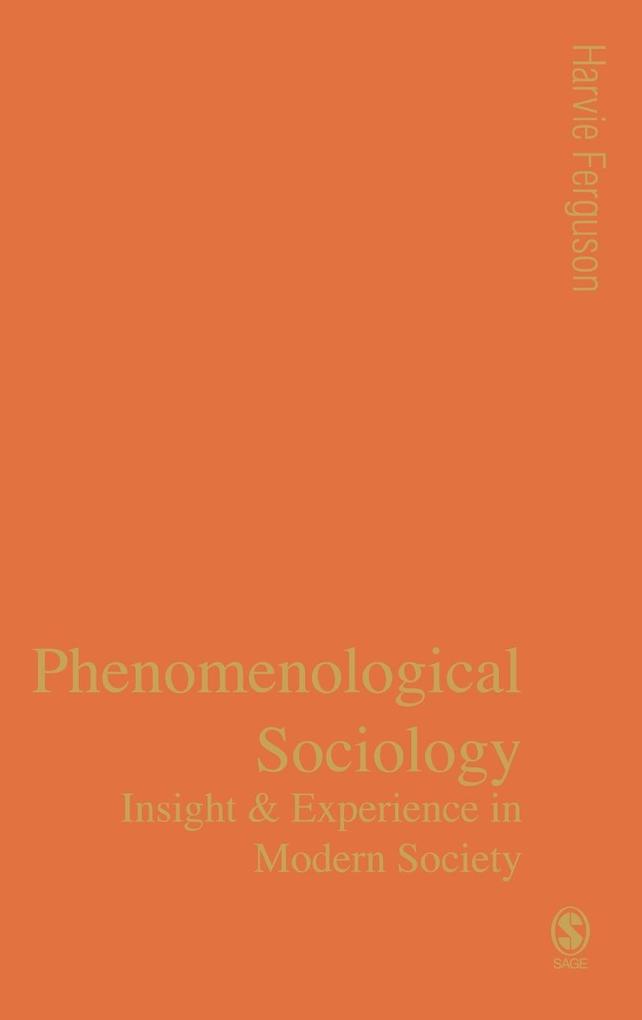
Zustellung: Sa, 16.11. - Mi, 20.11.
Versand in 1-2 Wochen
VersandkostenfreiBestellen & in Filiale abholen:
"Contemporary society constitutes a different form of modernity and Ferguson's innovative and thoughtful analysis calling for a return to phenomenology demonstrates that a relatively neglected perspective within contemporary sociological thought continues to provide significant insights into modern experiences'
- Barry Smart, Portsmouth University
"This may very well be the most thorough and authoritative analysis of phenomenological sociology ever achieved."
- W.P. Nye , Hollins University
What is phenomenological sociology? Why is it significant? This innovative and thought-provoking book argues that phenomenology was the most significant, wide-ranging and influential philosophy to emerge in the twentieth century.
The social character of phenomenology is explored in its relation to the concern in twentieth century sociology with questions of modern experience. Phenomenology and sociology come together as 'ethnographies of the present'. As such, they break free of the self-imposed limitations of each to establish a new, critical understanding of contemporary life. By reading phenomenology sociologically and sociology phenomenologically, this book reconstructs a phenomenological sociology of modern experience.
Erudite and assured, this book opens up a series of new questions for contemporary social theory that theorists and students of theory can ill-afford to ignore. The text contains a treasure trove of insights and propositions that will stimulate debate and research in both sociology and philosophy.
- Barry Smart, Portsmouth University
"This may very well be the most thorough and authoritative analysis of phenomenological sociology ever achieved."
- W.P. Nye , Hollins University
What is phenomenological sociology? Why is it significant? This innovative and thought-provoking book argues that phenomenology was the most significant, wide-ranging and influential philosophy to emerge in the twentieth century.
The social character of phenomenology is explored in its relation to the concern in twentieth century sociology with questions of modern experience. Phenomenology and sociology come together as 'ethnographies of the present'. As such, they break free of the self-imposed limitations of each to establish a new, critical understanding of contemporary life. By reading phenomenology sociologically and sociology phenomenologically, this book reconstructs a phenomenological sociology of modern experience.
Erudite and assured, this book opens up a series of new questions for contemporary social theory that theorists and students of theory can ill-afford to ignore. The text contains a treasure trove of insights and propositions that will stimulate debate and research in both sociology and philosophy.
Inhaltsverzeichnis
PART ONE: EXPLICATION
Astonishment
The Birth and Rebirth of the Phenomenal
Insight
Edmund Husserl s Clarification of Experience
Variation
Method and Theme in the Development of Phenomenology
Dialogue
Phenomenology in Social Theory
PART TWO: IMPLICATION
Experience
Historical Sociology of the Natural Attitude
Equivocation
Modern Trinitarian Conundrams
Society
Sociological Reductions
Indifference
Towards Contemporary Inexperience
Conclusion
Phenomenological Sociology
Astonishment
The Birth and Rebirth of the Phenomenal
Insight
Edmund Husserl s Clarification of Experience
Variation
Method and Theme in the Development of Phenomenology
Dialogue
Phenomenology in Social Theory
PART TWO: IMPLICATION
Experience
Historical Sociology of the Natural Attitude
Equivocation
Modern Trinitarian Conundrams
Society
Sociological Reductions
Indifference
Towards Contemporary Inexperience
Conclusion
Phenomenological Sociology
Mehr aus dieser Reihe
Produktdetails
Erscheinungsdatum
01. März 2006
Sprache
englisch
Seitenanzahl
248
Reihe
Published in association with Theory, Culture & Society
Autor/Autorin
Harvie Ferguson
Verlag/Hersteller
Produktart
gebunden
Gewicht
542 g
Größe (L/B/H)
240/161/18 mm
Sonstiges
HC gerader Rücken kaschiert
ISBN
9780761959861
Entdecken Sie mehr
Pressestimmen
"This may very well be the most thorough and authoritative analysis of phenomenological sociology ever achieved. The book's conclusion is both strong and surprising."
Bewertungen
0 Bewertungen
Es wurden noch keine Bewertungen abgegeben. Schreiben Sie die erste Bewertung zu "Phenomenological Sociology" und helfen Sie damit anderen bei der Kaufentscheidung.
































